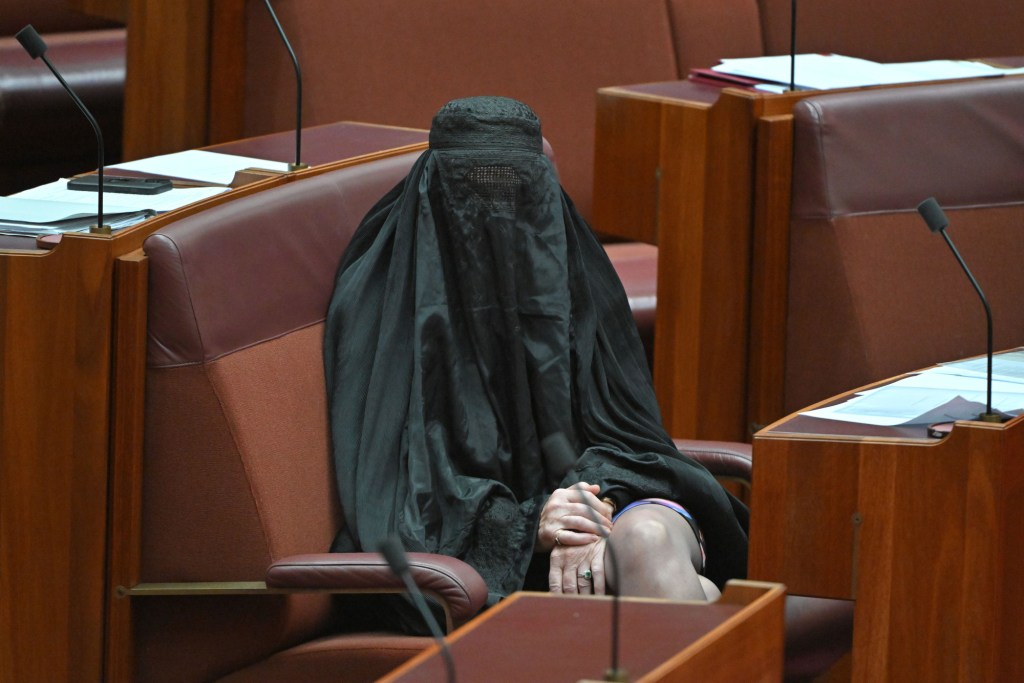Might a headscarf bring down France’s coalition government? The question of whether the Islamic garment should be permitted on the sports field has revealed the ideological differences within Prime Minister Francois Bayrou’s fragile government.
On the one hand, there are left-leaning ministers such as Elisabeth Borne (Education) and Marie Barsacq (Sport and youth) who see nothing wrong with the headscarf. Others, principally, Gérald Darmanin (Justice) and Bruno Retailleau (Interior), are fiercely opposed. Retailleau recently took Barsacq to task over her stance, saying the headscarf ‘is not a form of freedom, but a form of submission for women’.
The headscarf is just the latest attempt by Islamists to destabilise France
On Tuesday, Darmanin warned that he would consider his future if the government appeared ‘in favour of the wearing of headscarves in sporting organisations’. His threat to resign came three days after Retailleau made a similar pledge if the government didn’t stand up to Algeria in an escalating row over Algiers’ refusal to take back its law-breaking nationals. Both men have the backing of the centre-right Republican party, whose support is crucial in propping up Bayrou’s government.
It is Algeria’s flagrant contempt for international law, combined with their sanctimony, that has so infuriated the majority of the French, including Retailleau. He has promised that France will implement a ‘graduated response’ in the coming weeks. The form of these sanctions has yet to be disclosed, but Marine Le Pen applied pressure to Retailleau by declaring on social media:
The French people won’t understand if the government does not react firmly to the many provocations by the Algerian regime, which is violating its treaty obligations.
The French feel the same way about the wearing of the headscarf on the sports field, regarding it as the latest in a campaign of provocations by Islamists. In a survey published last week, 73 per cent of people supported its ban in a sporting context. This figure mirrors the vote in the French senate last month, when the wearing of the headscarf in sport was proscribed with 210 (72 per cent) voting for and 81 against the bill.
None of this appears to matter to Marie Barsacq, who said recently that ‘the issue of radicalisation in sport is a different matter from the wearing of the headscarf and religious symbols’. This drew a sharp response from Médéric Chapitaux, who sits on the government’s Secularism Council, and who wrote a book in 2023 entitled When Islamism penetrates sport. He accused Barsacq of ‘incompetence’ and, worse, indifference to how the Muslim Brotherhood has been spreading its tentacles into sport for many years in France. This phenomenon has existed at least since 2018, with radicalised young men forcing females out of sports clubs because their presence disturbed them.
A recent cross-party report presented to the National Assembly highlighted how in the years since this radicalisation has increased. There are now as many as 130 sports associations with ‘separatist aims’, in other words, clubs run ‘on the initiative of the Muslim Brotherhood in particular’. But the report puts the number of sports clubs displaying signs of religious influence at 500. Examples included members wearing headscarves, refusing to shake the hands of female officials, having separate changing rooms for Muslim players and the disbandment of girls/women’s sections.
The report, which was co-authored by members of Emmanuel Macron’s centrist party and Le Pen’s National Rally, expressed ‘astonishment’ that the Ministry of Sports had failed to keep a record of the number of breaches of secularism in clubs.
One might wonder if Marie Barsacq is out of her depth. After a distinguished career in sports administration, including the organising committee for the 2024 Paris Olympics, she was appointed Sports Minister in December, having never served before in government.
The headscarf is just the latest attempt by Islamists to destabilise France by cultivating a sense of victimhood among some of its Muslim population. In 2016, young women started appearing in burkinis on beaches and in 2023 pupils began arriving at school wearing the abaya. The Education Minister Gabriel Attal swiftly banned the full-length Islamic robe, describing it as ‘a religious gesture, aimed at testing the resistance of the republic’. Ditto for the headscarf on the sports field.
Bayrou summoned some of his warring ministers to a meeting on Tuesday, and the wearing of the headscarf was the principal topic of conversation. One of those present, Aurore Bergé, the Minister for Equality, said later that there is no longer any division within the government and all ministers are agreed that ‘no ostentatious religious symbol should be allowed to be worn in sporting competitions’.
Human rights organisations such as Amnesty International, in alliance with some left-wing MPs in France, have described the headscarf ban as ‘Islamophobic’. If that is the case, then might one not accuse Qatar of ‘Westernophobia’ in banning alcohol from stadiums when they hosted the 2022 World Cup? Beer and football are inextricably linked, going all the way back to 1863 when a group of Englishmen drew up the rules of the modern game in a London tavern.
Saudi Arabia, which will host the 2034 World Cup, has already announced that alcohol will not be available. Justifying the ban, the Saudi ambassador to the UK, Prince Khalid bin Bandar bin Sultan Al Saud, said: ‘We don’t allow alcohol, but plenty of fun can be had without it. It’s not 100 per cent necessary.’ One might say the same thing about headscarves on sports fields.








Comments